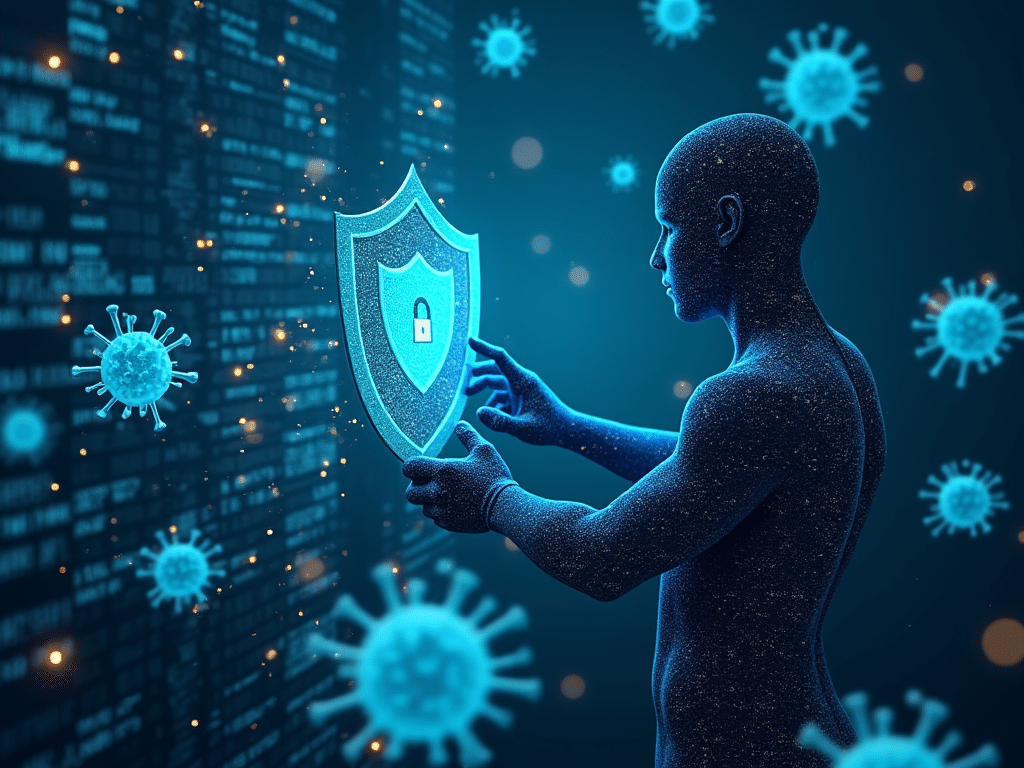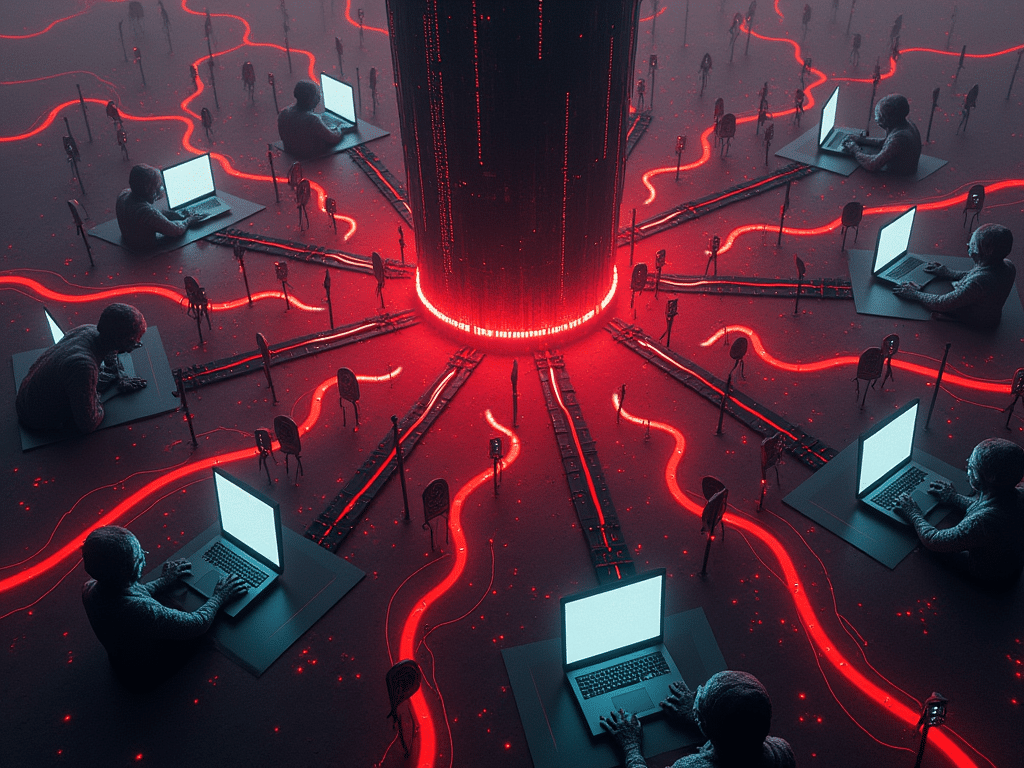Ever heard of botnets? 🤖 No, they’re not robot pets or some cool new tech gadget. Botnets are actually a big deal in the world of cybersecurity, and they’re not as friendly as they might sound. Think of them as invisible armies of computers that can cause all sorts of trouble online. Let’s dive into what botnets are all about and why you should care.
| Key Takeaways |
|---|
| Botnets are networks of infected computers |
| They’re controlled by hackers for malicious activities |
| Botnets can cause major damage to websites and steal data |
| Protecting your devices helps fight against botnets |
| Understanding botnets is crucial for online safety |

What is a Botnet?
Botnet Meaning: A botnet is a network of computers that have been infected with malware and are controlled by a hacker (often called the “botmaster”). These infected computers are known as “bots” or “zombies” because they follow the hacker’s commands without the owner knowing.
Botnet Meaning in Tech: In the tech world, botnets are seen as a serious threat. They’re used for all sorts of nasty stuff like attacking websites, sending spam emails, or stealing personal information. It’s like having an army of secret agents, but for the bad guys.
I remember when I first learned about botnets. I was working on a school project and suddenly our class website went down. Our teacher explained that it might have been a botnet attack. It blew my mind that someone could control thousands of computers to do something like that!
How Botnets Work
Alright, let’s break down how these digital troublemakers operate:
- Infection: It starts when a computer gets infected with malware. This can happen when you click on a sketchy link or download something you shouldn’t.
- Lying in Wait: The infected computer becomes part of the botnet, but you might not even notice. It’s like a sleeper agent in spy movies.
- Getting Orders: The hacker sends commands to all the infected computers in the botnet.
- Causing Chaos: The bots then carry out the hacker’s orders, which could be anything from sending spam to attacking websites.
It’s pretty scary stuff, right? But don’t worry, knowing about it is the first step to staying safe!
Common Uses of Botnets

So, what do hackers actually use botnets for? Here are some of their favorite tricks:
- DDoS Attacks: This stands for Distributed Denial of Service. It’s when a botnet floods a website with so much traffic that it crashes. Imagine if everyone in your school tried to go through one door at the same time – that’s kind of what a DDoS attack does to a website.
- Spam Central: Botnets are often behind those annoying spam emails that flood your inbox.
- Data Theft: They can be used to steal personal information like passwords or credit card numbers.
- Crypto Mining: Some botnets use your computer’s power to mine cryptocurrency without you knowing.
- Spreading More Malware: They can infect even more computers, making the botnet grow bigger.
Famous Botnet Examples
Let’s talk about some of the most notorious botnets out there. It’s like the hall of fame for cyber villains:
- Mirai: This botnet took down a bunch of major websites in 2016. It mainly infected smart home devices – yeah, even your smart fridge could be part of a botnet!
- ZeuS: This one was all about stealing banking information. It’s been around since 2007 and has stolen millions of dollars.
- Conficker: At its peak, this botnet infected millions of computers worldwide. It was so bad that governments and tech companies had to team up to fight it.
These botnets caused huge problems and cost millions of dollars in damage. It’s like digital vandalism on a massive scale!
Detecting Botnets
Now, you might be wondering, “How do I know if my computer is part of a botnet?” Good question! Here are some signs to watch out for:
- Your computer is running much slower than usual
- You see strange pop-ups or programs you didn’t install
- Your internet connection is super slow
- Your friends say they’re getting weird emails from you
If you notice these things, it might be time to run a good antivirus scan or ask for help from someone who knows about computers.
Preventing Botnet Infections

Okay, so how do we keep our devices from becoming part of these digital zombie armies? Here are some top tips:
- Keep Everything Updated: Those annoying software updates? They’re actually super important. They often fix security holes that botnets could use to infect your device.
- Use Strong Passwords: And I mean really strong. Mix up letters, numbers, and symbols. And please, don’t use “password123”! 🙈
- Be Careful What You Click: Think twice before clicking on links in emails or downloading attachments from people you don’t know. It’s like the digital version of “don’t take candy from strangers.”
- Use Antivirus Software: It’s like a shield for your computer. Make sure it’s always on and up-to-date.
- Be Smart on Public Wi-Fi: Public Wi-Fi can be risky. Avoid doing sensitive stuff like online banking when you’re connected to it.
The Economics of Botnets
Now, you might be wondering, “Why do people create botnets anyway?” Well, usually it’s all about the money. 💰 Cybercriminals can make big bucks by:
- Renting out their botnets to other criminals
- Using them to steal valuable data
- Blackmailing companies with threats of DDoS attacks
It’s like a shady underground business, but instead of selling illegal goods, they’re selling access to infected computers.
Legal and Ethical Issues
Creating and using botnets is illegal in most countries. It’s considered a form of cybercrime. But here’s where it gets tricky: sometimes researchers create botnets to study them and figure out how to stop them. It’s like how scientists might study dangerous viruses to create vaccines.
There’s a big debate about whether it’s okay to do this, even for research. It’s a bit like the debate around ethical hacking, where people hack systems to find and fix security problems.
The Future of Botnets
Botnets are always evolving, just like other tech. Here are some trends to watch out for:
- IoT Botnets: As more devices connect to the internet (like smart fridges or thermostats), botnets might start targeting these too.
- AI-Powered Botnets: Imagine botnets that can learn and adapt. Scary, right?
- 5G and Botnets: Faster internet might mean faster, more powerful botnets.
It’s not all doom and gloom though! As botnets evolve, so do the ways we fight them.
Combating Botnets: A Global Effort
Fighting botnets isn’t just up to individual users or even single countries. It’s a worldwide effort:
- International Cooperation: Countries work together to track down and stop botnet operators.
- Tech Companies: Big tech firms like Microsoft and Google are always working on ways to detect and disrupt botnets.
- ISPs (Internet Service Providers): They play a big role in identifying and blocking botnet traffic.
It’s like a global game of cops and robbers, but online!
Wrapping It Up
Alright, let’s bring it home. Botnets are a serious threat in our digital world, but understanding them is half the battle. By staying informed and following good online safety practices, we can all do our part to fight against these cyber threats.
Remember:
- Keep your devices updated
- Be careful what you click on
- Use strong passwords
- Stay informed about online threats
By doing these things, you’re not just protecting yourself – you’re helping to make the whole internet a safer place. And that’s pretty cool, right?
FAQs About Botnets
Q: Can my phone be part of a botnet?
A: Yes, smartphones can be infected too. Keep your phone updated and be careful what apps you install.
Q: How big can botnets get?
A: Some of the largest botnets have included millions of devices!
Q: Is it only criminals who use botnets?
A: While mostly used for illegal activities, some researchers use botnets to study cybersecurity.
Q: Can a botnet be stopped completely?
A: It’s tough to stop them entirely, but we can make it harder for them to operate and cause damage.
So there you have it – your crash course in botnets! Next time you hear about a big cyberattack on the news, you’ll know what might be behind it. Stay safe out there in the digital world! 🖥️🛡️







